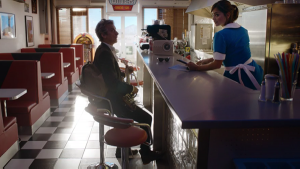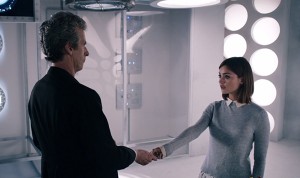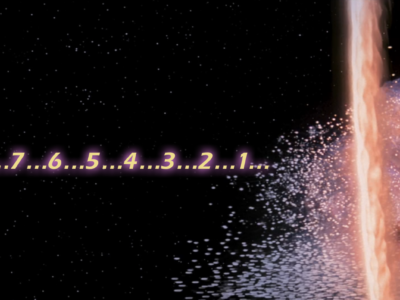Who·ology #024 – S09E12 Hell Bent
Welcome Whovians, to the new incarnation of Who·ology here on Reel World Theology. Unlike the return of Missy to this season of Doctor Who, we have reasons for the regeneration of this weekly feature from podcast to written review, but suffice to say, we still love Who and still plan to bring you our take on it each week to hopefully stir some discussion. So let’s get to it!
 Here we are at the end, Whovians, and I don’t know about you but I am sad to see this season go. I am happy to see that we’ve come full circle thematically, something arguably absent from any full season arc since season five. While I don’t particularly like rankings (you like what you like and that’s okay) I would line this season up among the very best of modern Who. So, what did we learn?
Here we are at the end, Whovians, and I don’t know about you but I am sad to see this season go. I am happy to see that we’ve come full circle thematically, something arguably absent from any full season arc since season five. While I don’t particularly like rankings (you like what you like and that’s okay) I would line this season up among the very best of modern Who. So, what did we learn?
We have reached the end of Clara’s story (again) and while it was very Moffatt-y (remember that word?) the way it went down, it didn’t take us away from having some real consequences to deal with. Moffatt cannot kill his darlings, so Clara sort of lives on. Despite that mistake, I think the resolution gives us what we need most from a story about a two thousand-year-old alien who runs free across time and space, and that is- the Doctor doesn’t always get anything and everything he wants.
There was a lot of talk this season about the Doctor winning. As in, even when the situation is dire, he can and should figure out a way to win. When you’re fighting bad guys or trying to stop global destruction, that’s a good thing. But what if that situation threatened the fabric of the universe? Should he continue to win? The answer is no, but it’s hard to tell that to a nearly immortal being with a TARDIS.
 Finally, this idea comes to a head. The story of the Doctor and Clara is a story about addiction. Last season touched on Clara’s addiction to the Doctor. This season did a much better job of digging into that, and rightfully illustrated that the Doctor was just as much addicted to her. We find out the hybrid could very well be this concept of two inseparable people acting as one Doctor forsaking what is good to remain together. It’s the concept articulated so well in the film The Dark Knight; “you either die the hero or you live long enough to see yourself become the villain.” Except as usual, the Doctor is stopped by his companion before he becomes the thing he hates.
Finally, this idea comes to a head. The story of the Doctor and Clara is a story about addiction. Last season touched on Clara’s addiction to the Doctor. This season did a much better job of digging into that, and rightfully illustrated that the Doctor was just as much addicted to her. We find out the hybrid could very well be this concept of two inseparable people acting as one Doctor forsaking what is good to remain together. It’s the concept articulated so well in the film The Dark Knight; “you either die the hero or you live long enough to see yourself become the villain.” Except as usual, the Doctor is stopped by his companion before he becomes the thing he hates.
“It is for freedom Christ has set us free. Stand firm, therefore, and do not submit again to a yoke of slavery” – Galatians 5:1
The Apostle Paul knew a thing or two about freedom. In his letter to the Galatians he was addressing a people who were submitting themselves back to old practice that enslaved them to rules and obligations. Yet the Galatians themselves had seen Christ crucified and his resurrection, and understood the gospel that they were no longer under the old law. Paul reminds them that they were set free, but he doesn’t just leave it at that. Most importantly, he warns them not to submit again to the yoke of slavery.
We forget that we are free. Religion often demands perfection when such a thing isn’t possible. Christ came to set us free from that. Why? Because the only way to be good is to be free from the burden that your eternity rests on your own perfection. You cannot truly love or truly live with a knife to your neck.
 It’s a bit of an uneven parallel, but this is what I saw from the Doctor here. Clara was a yoke of slavery for the Doctor. Far more than the show ever was smart enough to really explore- the Doctor would ignore others for the sake of Clara. And as she kept rightly pointing out, he was quick to drop the “Doctor” title if he had to in order to save her. In short, he stopped being truly good out of obligation to her.
It’s a bit of an uneven parallel, but this is what I saw from the Doctor here. Clara was a yoke of slavery for the Doctor. Far more than the show ever was smart enough to really explore- the Doctor would ignore others for the sake of Clara. And as she kept rightly pointing out, he was quick to drop the “Doctor” title if he had to in order to save her. In short, he stopped being truly good out of obligation to her.
Try as he might, even his good works couldn’t save her and couldn’t right his wrongs. He had to be free from his yoke. That’s why good works alone cannot save us. If we submit ourselves to keeping the law, we will fail, and our good works will amount to nothing. But if we are free as we are in Christ, goodness will thrive and grace will abound through us. The Galatians were bewitched by false rhetoric. The Doctor was bewitched by his addiction. Once these things are removed, all of time and space can benefit from the unhindered goodness of the Doctor. Or in our case, the grace of God.
Next Time on Who-ology: River Song returns for better or worse. We have a new sonic screwdriver at last! And it looks like this year’s Christmas special is hell bent on being a lighthearted romp (see what I did there?) Plus, I will wrap up this year of Who and look forward to what could be on the horizon. Merry Christmas, Whovians!







